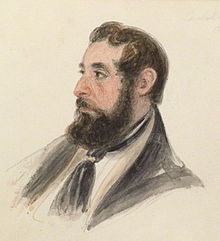Arthur Conolly
| Arthur Conolly | |
|---|---|

Arthur Conolly, by James Atkinson
|
|
| Born |
2 July 1807 London |
| Died | 17 June 1842 (aged 34) Bukhara |
Arthur Conolly (2 July 1807, London - 17 June 1842, Bukhara) (sometimes misspelled Connolly) was a British intelligence officer, explorer and writer. He was a captain of the 6th Bengal Light Cavalry in the service of the British East India Company. He participated in many reconnaissance missions into Central Asia and coined the term The Great Game to describe the struggle between the British Empire and the Russian Empire for domination over Central Asia.
Conolly was a descendant of an Ó Conghalaigh clan of Ireland. He was a cousin of Sir William Macnaghten, Secretary of the Company's Political and Secret Department.
As a sixteen-year-old impressionable Cadet he sailed to India on the Grenville and listened to the newly appointed Bishop of Calcutta evangelize. Thereafter Conolly sought to win over Muslims to a "kindlier" view of Christians, the first step in his view of propagating the Gospel.
In July 1840, in a correspondence with Major Henry Rawlinson who had been recently appointed as the political agent in Kandahar, Conolly stated:
You've a great game, a noble game, before you.
Conolly believed that Rawlinson's new post gave him the opportunity to advance humanitarianism in Afghanistan, and summed up his hopes:
"If the British Government would only play the grand game — help Russia cordially to all that she has a right to expect — shake hands with Persia — get her all possible amends from Oosbegs — force the Bokhara Amir to be just to us, the Afghans, and other Oosbeg states, and his own kingdom — but why go on; you know my, at any rate in one sense, enlarged views. Inshallah! The expediency, nay the necessity of them will be seen, and we shall play the noble part that the first Christian nation of the world ought to fill."
Often travelling in disguise, he used the name "Khan Ali" in a word-play on his true name. In late 1829 he left Moscow for the Caucasus and Central Asia, arriving in Herat in September 1830 and in India in January 1831. In 1834 he published an account of his trip, which established his reputation as a traveller and writer.
...
Wikipedia
